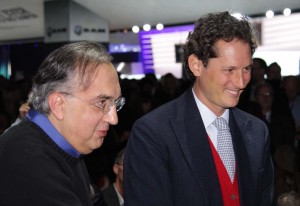
Sergio Marchionne, now chairman of a united Fiat-Chrysler, and Fiat Chairman John Elkan during the Detroit Auto Show.
The news comes a day later than originally promised but after establishing their alliance nearly five years ago, suburban Detroit-based Chrysler Group is now a wholly-owned subsidiary of Fiat SpA.
The partnership began in 2009 when the Italian maker came to the rescue of the bankrupt Chrysler. Since then, Fiat steadily expanded its stake in the U.S. maker, announcing a deal on January 1st to purchase the remaining shares of Chrysler held by the United Auto Workers Union’s retiree health care trust, known as a VEBA.
At that time, Fiat had indicated it would complete the takeover by January 20th. But there appears to have been no last-minute hitch, just the fact that “It was a holiday yesterday,” explains Richard Gadeselli, the London-based Fiat spokesman adding that there have been “no changes whatsoever” to the terms announced on New Year’s Day.
That means Fiat will pay the union fund a total of $2.8 billion in four annual installments, the first paid “contemporaneously” with the closing of the deal today. Separately, Chrysler will pay a special distribution of $1.9 billion to the UAW.
The completion of the deal comes as a major accomplishment for Sergio Marchionne who has been serving as CEO of both companies since they began their alliance in mid-2009. Chrysler went into bankruptcy earlier that year but unlike its cross-town rival General Motors – which also filed for Chapter 11 – it was less certain the smaller maker would survive. The Obama Administration approved a bailout for Chrysler only after it found its white knight.
(Chrysler aiming to boost sales to 2 million annually. Click Here for details.)
Fiat initially acquired a 20% stake in the U.S. maker, steadily expanding its position by meeting a series of hurdles and by paying off the outstanding bailout loans. But it appeared to reach a roadblock one it increased its Chrysler holdings to 58.5%.
The problem was a major disagreement over the remaining shares hold by the UAW VEBA. The two sides took the dispute to court in Delaware but with no immediate resolution likely, the union pressed Chrysler to stage a public stock offering.
That created problems for both the union and the automakers. Marchionne wanted to avoid an IPO which could have complicated Fiat’s relationship with Chrysler. But there were also signs that Wall Street was reluctant to invest in the planned offering. That led the two sides to hammer out an unexpected deal on the first day of 2014.
(Marchionne agrees to 3-year contract extension. For more, Click Here.)
In a letter to employees, Marchionne and Fiat Chairman John Elkan wrote that, “In reality, this extraordinary union already existed,” adding that “Over the past few years, the two groups have learned to understand and trust each other. They have made each other stronger through the sharing of know-how and experience. They have committed to a common future.”
Nonetheless, there are a number of questions that still remain unanswered, among them where the newly merged makers will place their formal headquarters. Fiat is based in its ancestral home of Turin, Italy but it has a relatively small base of operations there compared to Chrysler. The U.S. maker operates a massive corporate campus in the Detroit suburb of Auburn Hills that includes design, engineering and marketing operations as well as its long-time headquarters.
(Chrysler betting big on all-new 200 midsize sedan. Click Here for a closer look.)
Over the last several years, the Canadian-educated Marchionne has hinted he is far from loyal to Italy. He has closed a key car plant there to reduce excess capacity and has pressed for major concessions to bring down production costs. He has, on the other hand, opened up or expanded several plants that were to have been abandoned under the Chrysler bankruptcy plan. Marchionne has also expressed interest in shifting Fiat stock from a listing in Italy to the New York Stock Exchange.
For his part, Marchionne suggested that, “Talking about headquarters is almost an anachronistic term in the way multinational corporations operate today,” during an appearance at the North American International Auto Show last week. “Power travels,” he added, though he acknowledged Detroit is “especially relevant” because of the increasingly important role it plays in the alliance now. While Fiat might have come to Chrysler’s rescue five years ago, it is the U.S. automaker that is providing the big cash now, especially with Fiat struggling to cope with the ongoing automotive recession in Europe.
